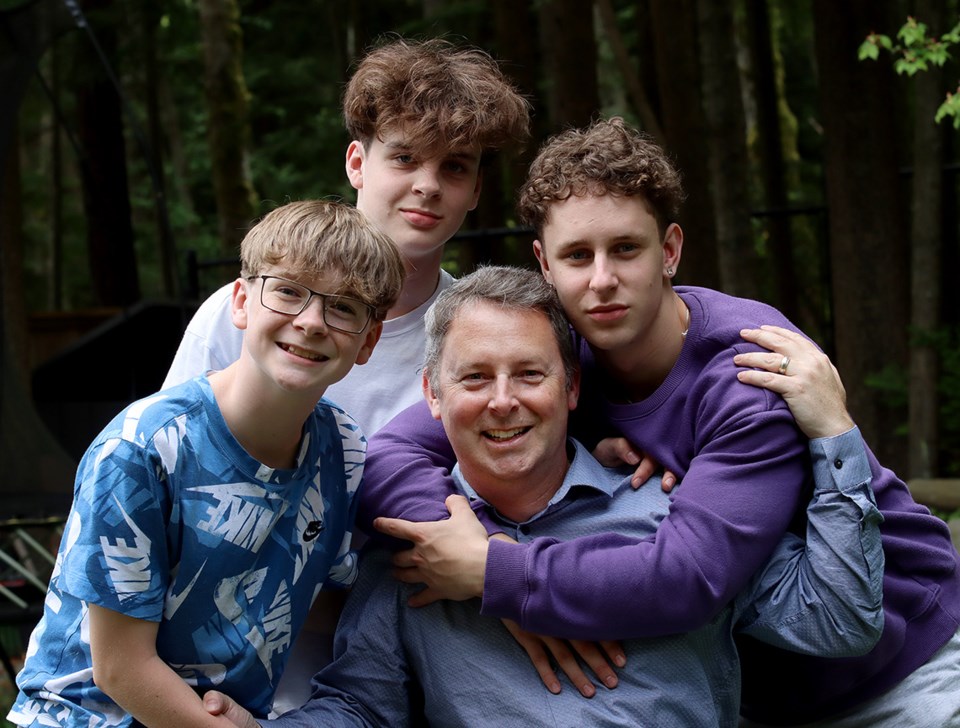Paul Carter beamed with more than just pride when his sons, Adam and Matthew, recently received rescue awards of merit from the Lifesaving Society.
The life they saved was his.
The Carters, along with his wife, Andrea, and their younger son, Daniel, 12, were with family friends enjoying a day at the beach at Haywire Bay in Powell Lake near Powell River on Aug. 1, 2021, when the boys decided to swim out about 100 metres to explore a nearby island.
Adam, who’s now 16, had recently received his National Lifeguarding certification and swims competitively with the Coquitlam Sharks. Matthew, 14, and Daniel also belong to the Sharks. So for them, the distance and cold water presented little challenge.
Left all alone on the hot beach, as his wife wandered off elsewhere, Paul could see across the bay to the island where his boys, their friends and dad seemed to be having a lot of fun.
“Why am I here all by myself?” he thought before wading into the water to begin the swim to join them.
Who's at risk from drowning?
According to the Lifesaving Society, there’s an average 458 deaths by drowning every year in Canada. A quarter of them are between the ages of 50 and 64, almost 80 per cent are male, 34 per cent occur in lakes or ponds and two-thirds take place between the months of May and September.
Carter was right in the statistical wheelhouse. He just didn’t know it. Yet.
Halfway to the island, Carter began to realize the distance and cold water were more than his 50-year-old body and recreational swimming ability could handle. He’d gone out too fast and now he was paying for his hubris.
Carter paused to catch his breath, treading water for a minute or so.
Determined to reach the island, he resumed swimming. But 10 metres later he was exhausted.
'I started panicking'
Carter tried to make up his mind whether he should continue going forward or turn back when a wave hit him square in the face. He swallowed a mouthful of water and began coughing violently, further depleting his waning energy.
Carter’s breathing quickened. His arms and legs slowed.
“That’s when I started panicking,” he recalled. “I did the calculation that I wouldn’t be able to get anywhere where I was safe.”
Carter said he mustered the strength to let out one call, for Adam.
The eldest boy, who attends Heritage Woods Secondary School in Port Moody, said he just happened to be on the beach on the island’s leeward side when he heard his dad call out. While his friend’s father thought Carter was just messing around, Adam said his dad’s shout had a tone “I’ve never heard used before.”
In trouble
When he looked across the water, he could see Carter wasn’t moving much. The instinctive drowning response, in which humans close to drowning focus all their attention on keeping their mouth above water to the exclusion of any useful effort to save themselves or attract attention, had taken over.
“I knew deep down he was in trouble,” Adam said.
He jumped into the water and let his lifeguard training take over.
Reaching his dad, Adam rolled him onto his back and used his chest to elevate Carter out of the water. He told his dad he was going to be OK, implored him to kick his feet to help propel them back toward the safety of the beach.
By then, Matthew was also in the water.
'We've got to do this'
“I knew it was an emergency,” he said.
When Matthew reached his dad and brother, Adam told him, “We’ve got to do this.”
He wrapped Carter’s arm around his shoulder and the three paddled to shore.
Carter said the whole incident took about five minutes to play out, but “in the moment it seemed a lot longer.”
Back on land, coughing out more of the water he’d swallowed, Carter became a parent again and checked on his boys.
They “looked exhausted,” he said. “You feel bad about the situation you put your kids in.”
Andrea, who was now back on the scene after being alerted by others about what was going on, transported the trio to the hospital to make sure they were OK.
The good scenario
It was during the drive Adam started to come to grips with what had just transpired.
“We just save our dad from dying,” he said, adding he thought about all the different scenarios that could have happened, but “we got the good one.”
Carter said he was thankful he and his wife had encouraged their boys to take up swimming at a young age.
“You never know when it’s going to be important,” he said.
Young Daniel, who’d watched the whole event play out before him, said, “It’s just a good thing for everyone to learn.”
Since then, Carter said, the family’s often reflected on what happened. Sometimes, he said, he’s wracked with guilt.
“What if my family had lost me?” he said. “How tragic would that have been.”
Adam’s take is a little more pragmatic. “It felt like it was something I should have done.”
Daniel’s nonplussed.
“It could have been the worst day of my life, but now it was just a thing that happened.”
Still, Carter said, there are valuable lessons to be learned, especially as summer approaches and people begin heading to beaches to cool off.
“I made a few bad decisions,” he said. “Drowning doesn’t look like when you see it on TV.”


